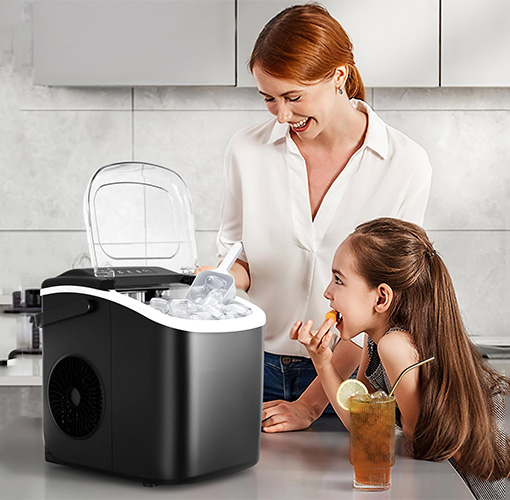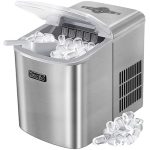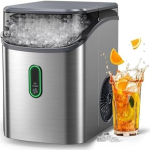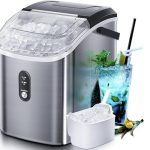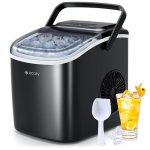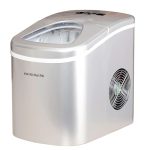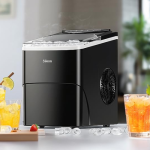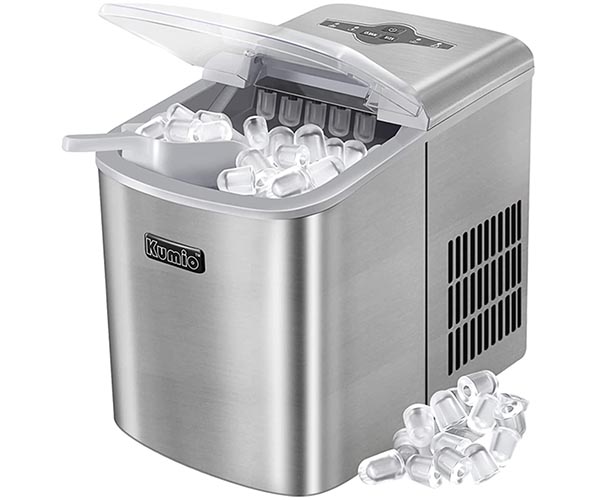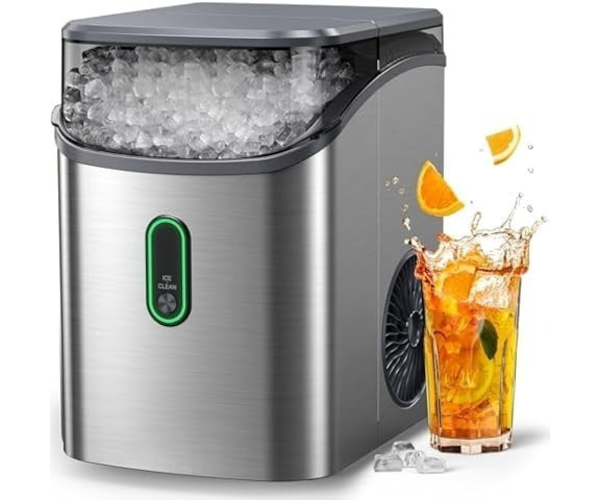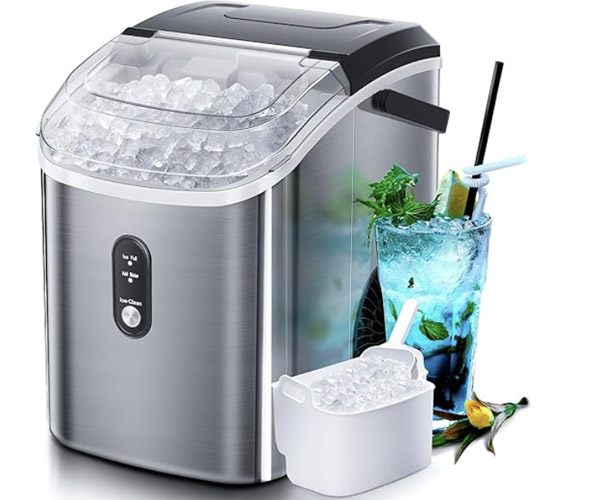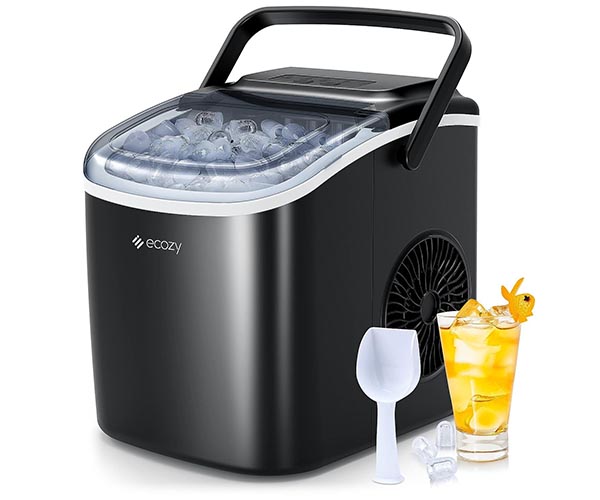Introduction
Imagine running a bustling small bar, packed with customers enjoying their favorite drinks. Everything is going smoothly until you run out of ice. The drinks become less appealing, the customers grow impatient, and the service slows down. This scenario highlights the crucial role that ice plays in a bar setting. For small bars, finding the perfect ice maker is not just a matter of convenience but a necessity. In this comprehensive guide, we will explore everything you need to know about compact ice makers, focusing on their importance, benefits, features, and how to choose the best one for your small bar. https://amzn.to/3ShXndQ
The Importance of Ice in Bars
Role of Ice in Drinks
Ice is an essential ingredient in many beverages served at bars. It not only chills the drinks but also affects their taste, texture, and overall presentation. For cocktails, the right type of ice can make a significant difference. For instance, large, clear cubes are preferred for spirits like whiskey because they melt slowly and prevent dilution. On the other hand, crushed ice is ideal for tropical drinks like mojitos and margaritas, where rapid chilling and some dilution enhance the flavor. Understanding the role of ice helps bar owners appreciate why a reliable ice-making machine is crucial.
Impact on Customer Experience
Customer satisfaction is paramount in the bar industry. The quality of drinks plays a significant role in how customers perceive their experience. Properly chilled drinks with the right ice can elevate the overall enjoyment, making customers more likely to return. A countertop ice maker commercial unit can ensure a consistent supply of high-quality ice, which in turn maintains the high standards of the beverages served. This not only improves customer satisfaction but also enhances the reputation of the bar.
Operational Efficiency
In a busy bar, efficiency is key. The faster the service, the more customers can be served, which directly impacts the revenue. An efficient water ice machine ensures that bartenders have a continuous supply of ice, reducing wait times for customers and allowing bartenders to focus on crafting the perfect drink. This seamless operation is especially critical during peak hours when demand is high, and any delay can lead to customer dissatisfaction and potential loss of business.
What is a Compact Ice Maker?
Definition and Function
A compact ice maker, often referred to as a countertop ice maker commercial unit, is a small, portable machine designed to produce ice efficiently in limited spaces. Unlike traditional, larger ice machines that require significant space and installation, compact ice makers are designed to fit on countertops or under counters, making them ideal for small bars. These machines work by freezing water into ice within minutes, providing a quick and convenient solution for ice production.
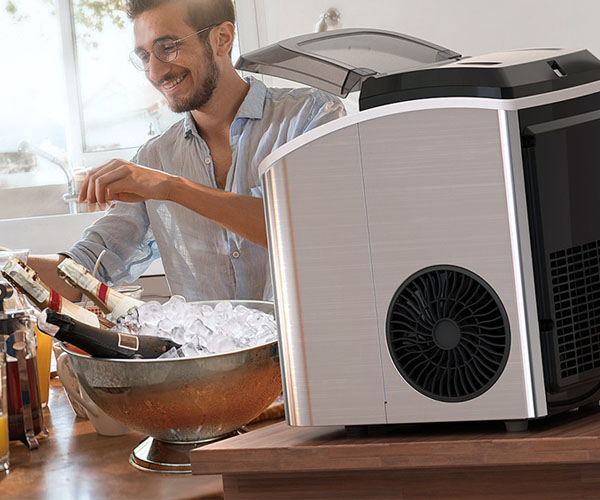
Types of Ice Produced
Compact ice makers can produce various types of ice, each suitable for different kinds of drinks and applications. Some common types include:
- Bullet Ice: Cylindrical-shaped ice with a hollow middle, perfect for cooling drinks quickly.
- Cube Ice: Solid, square-shaped ice cubes that melt slowly and are ideal for cocktails and spirits.
- Nugget Ice: Also known as chewable ice, it’s small, soft, and perfect for blended drinks and cocktails.
- Flake Ice: Thin, flat pieces of ice often used for presentations and chilling seafood or produce.
Understanding the types of ice produced by a compact ice maker can help bar owners choose the right machine that meets their specific needs.
Key Features
Compact ice makers come with a range of features designed to enhance their functionality and convenience. Some key features to look for include:
- Size: Compact dimensions to fit in small spaces.
- Capacity: The amount of ice the machine can produce in a 24-hour period.
- Production Speed: How quickly the machine can produce ice.
- Energy Efficiency: Machines that use less energy to save on operating costs.
- Portability: Easy to move and install without the need for professional help.
These features make compact ice makers a versatile and practical choice for small bars, ensuring a steady supply of ice without taking up much space or requiring extensive maintenance.
Benefits of Using Compact Ice Makers in Small Bars
Space-Saving Design
One of the most significant advantages of compact ice makers is their space-saving design. Small bars often have limited space, and every square inch counts. A countertop ice maker commercial unit is designed to fit in tight spaces, either on the bar counter or under it, without compromising on the volume of ice produced. This efficient use of space allows bar owners to maximize their operational area, ensuring that bartenders have everything they need within easy reach.
Efficiency
Compact ice makers are designed for quick and efficient ice production. They can produce a substantial amount of ice within a short period, ensuring that bars can meet high demand during peak hours. This efficiency is crucial for maintaining a steady flow of service, as bartenders can quickly replenish ice supplies without waiting for long production cycles. The rapid production capability of these machines ensures that the bar can serve a large number of customers without running out of ice. https://amzn.to/3ShXndQ
Cost-Effectiveness
Operating a small bar involves careful management of costs, and a compact ice maker can be a cost-effective solution. These machines typically consume less energy compared to larger, commercial ice machines, leading to lower utility bills. Additionally, the initial investment for a compact ice maker is generally lower, making it a more affordable option for small bars. Over time, the cost savings on energy and the reduced need for frequent ice deliveries can add up, making the investment in a compact ice maker a financially sound decision.
Portability
The portability of compact ice makers is another significant benefit. Unlike large, fixed ice machines that require professional installation and cannot be easily moved, compact ice makers can be relocated as needed. This flexibility is particularly useful for bars that may need to reconfigure their layout or move the machine to different areas depending on the demand. The ease of installation and relocation also means that bar owners can quickly set up or adjust their ice-making capabilities without incurring additional costs.
Key Considerations When Choosing a Compact Ice Maker
Capacity and Production Rate
When selecting a compact ice maker, one of the first considerations should be its capacity and production rate. The capacity refers to the amount of ice the machine can store at one time, while the production rate indicates how much ice it can produce in a 24-hour period. For small bars, it is essential to choose a machine that aligns with the expected demand during peak hours. A machine with a high production rate ensures that the bar can continuously serve ice-cold drinks without interruptions.
Ice Type and Quality
Different drinks require different types of ice, and the quality of ice can significantly impact the drinking experience. It is important to choose a compact ice maker that produces the type of ice suitable for the bar’s menu. For example, bullet ice is versatile and melts slowly, making it suitable for a wide range of beverages. Cube ice is ideal for cocktails and spirits, while nugget ice is perfect for blended drinks. Ensuring the machine produces clear, clean ice without impurities is also crucial for maintaining drink quality.
Energy Consumption
Energy efficiency is a key consideration for any commercial appliance, including compact ice makers. Machines that consume less energy not only reduce operational costs but also have a smaller environmental footprint. Look for models that are Energy Star certified or have high energy efficiency ratings. These machines use advanced technologies to produce ice more efficiently, saving on electricity bills and contributing to a more sustainable operation.
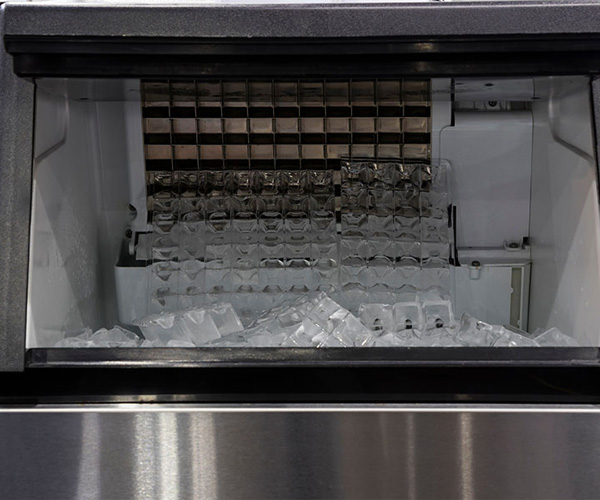
Noise Levels
Noise can be a concern in a small bar, where a noisy machine can disrupt the ambiance and affect the customer experience. When choosing a compact ice maker, consider the noise levels it produces during operation. Modern ice makers are designed to operate quietly, minimizing disruptions. Checking user reviews and product specifications for noise ratings can help bar owners select a machine that maintains a pleasant bar environment.
Ease of Maintenance
Regular maintenance is essential for the optimal performance of any ice maker. Choosing a machine that is easy to clean and maintain can save time and effort. Features like self-cleaning functions, accessible components, and clear maintenance instructions can simplify the upkeep process. Regular maintenance not only ensures the machine produces high-quality ice but also prolongs its lifespan, providing long-term value for the investment.
Durability and Warranty
Investing in a durable compact ice maker is crucial for long-term reliability. Look for machines built with high-quality materials and robust construction that can withstand the demands of a busy bar environment. Additionally, consider the warranty terms offered by the manufacturer. A good warranty provides peace of mind, covering repairs or replacements for any defects or issues that may arise. Checking the warranty details and customer service reputation can help bar owners choose a reliable and trustworthy brand.
Top Features to Look for in Compact Ice Makers
Size and Dimensions
The size and dimensions of a compact ice maker are critical factors, especially for small bars with limited space. It’s important to measure the available space where the ice maker will be placed and choose a machine that fits comfortably without obstructing other equipment or workflow. Compact ice makers come in various sizes, so selecting one with the right dimensions ensures it integrates seamlessly into the bar setup.
Ice Storage Capacity
The ice storage capacity of a compact ice maker determines how much ice the machine can hold at one time. For bars that experience fluctuating demand, having a machine with adequate storage capacity is essential to handle peak times without running out of ice. A larger storage capacity means the machine can produce and store more ice, reducing the frequency of ice replenishment and ensuring a consistent supply during busy hours.
Speed of Ice Production
The speed at which an ice maker produces ice is a crucial feature, especially for bars with high customer turnover. Fast production rates ensure that ice is always available, preventing any delays in service. Some compact ice makers can produce ice in as little as 6-8 minutes, making them ideal for bars that need a rapid supply of ice. Evaluating the production speed in relation to the bar’s needs helps in selecting the right machine that can keep up with demand.
Water Source Options
Compact ice makers can be either plumbed-in or use a refillable water reservoir. Plumbed-in models are connected directly to a water supply, providing a continuous source of water for ice production. These models are convenient for bars with a fixed location and access to plumbing. Refillable models, on the other hand, have a water reservoir that needs to be manually filled. These are ideal for bars that require portability or do not have access to a direct water line. Choosing the right water source option depends on the bar’s setup and operational needs.
User-Friendly Controls
User-friendly controls make operating the ice maker straightforward and hassle-free. Look for machines with intuitive control panels that allow bartenders to easily adjust settings, start or stop ice production, and monitor the machine’s status. Features like digital displays, touch controls, and clear indicators enhance usability and ensure that the machine can be operated efficiently without the need for extensive training.https://amzn.to/3ShXndQ
Self-Cleaning Functions
Maintaining cleanliness in an ice maker is essential to ensure the quality of the ice and the longevity of the machine. Many modern compact ice makers come with self-cleaning functions that simplify the cleaning process. These functions typically involve automated cleaning cycles that flush out impurities and sanitize the internal components. Self-cleaning functions save time and effort, making it easier to keep the machine in optimal condition and ensuring that the ice produced is safe and hygienic.
Popular Compact Ice Maker Models for Small Bars
Brand and Model Comparisons
When choosing a compact ice maker, it’s helpful to compare different brands and models to find the one that best meets your needs. Some of the top brands in the market include Scotsman, Hoshizaki, and Manitowoc. Each brand offers a range of models with varying features and capacities. For example, Scotsman is known for its reliable and energy-efficient ice makers, while Hoshizaki machines are praised for their durability and high production rates. Manitowoc offers a variety of compact models with innovative features like programmable production cycles and advanced water filtration systems.
Pros and Cons
Analyzing the pros and cons of each model helps in making an informed decision. For instance, a model from Scotsman might be highly efficient and produce clear, high-quality ice, but it may come with a higher price tag. On the other hand, a Hoshizaki model might offer robust construction and a large storage capacity but could be noisier during operation. Understanding these trade-offs ensures that you select a machine that aligns with your bar’s specific requirements and budget.
User Reviews and Ratings
User reviews and ratings provide valuable insights into the real-world performance of compact ice makers. Reading reviews from other bar owners can highlight the strengths and weaknesses of different models, helping you gauge their reliability and suitability for your needs. Look for machines with consistently high ratings and positive feedback regarding their performance, ease of use, and maintenance. User reviews can also shed light on any potential issues or common problems, allowing you to make a more informed choice.
Installation and Setup Tips
Space Requirements
Proper installation of a compact ice maker involves considering the space requirements to ensure optimal performance. It’s essential to leave enough clearance around the machine for ventilation and easy access for maintenance. Check the manufacturer’s recommendations for the minimum space needed around the unit to prevent overheating and ensure efficient operation. Additionally, consider the location of the ice maker in relation to other equipment and workflow to avoid congestion and maintain smooth operations.
Electrical and Plumbing Needs
Compact ice makers typically require a dedicated electrical outlet and, for plumbed-in models, access to a water supply. Ensure that the electrical outlet matches the voltage requirements of the machine and that it is within reach of the installation site. For plumbed-in models, verify that the water supply is easily accessible and that the necessary plumbing connections are in place. If needed, consult a professional plumber to ensure proper installation and prevent any leaks or issues with water flow.
Professional Installation vs. DIY
Deciding between professional installation and a DIY approach depends on your comfort level with handling electrical and plumbing connections. Professional installation ensures that the ice maker is set up correctly and complies with safety standards. It also reduces the risk of installation errors that could affect the machine’s performance. However, for those with experience and confidence in handling such tasks, DIY installation can be a cost-saving option. Follow the manufacturer’s instructions carefully and ensure all connections are secure and properly configured.
Maintenance Tips
Regular maintenance is crucial for the longevity and performance of a compact ice maker. Some essential maintenance tips include:
- Regular Cleaning: Clean the machine regularly to prevent the buildup of minerals and impurities. Use the self-cleaning function if available and follow the manufacturer’s guidelines for manual cleaning.
- Filter Replacement: Replace water filters as recommended to ensure the quality of the ice and the efficiency of the machine.
- Inspect Components: Regularly inspect the machine’s components, such as the ice bin, water lines, and condenser, for any signs of wear or damage. Address any issues promptly to prevent further problems.
- Monitor Performance: Keep an eye on the machine’s performance and listen for any unusual noises or changes in ice production. Early detection of potential issues can prevent costly repairs and downtime.
By following these maintenance tips, bar owners can ensure that their compact ice maker remains in optimal condition, providing reliable ice production for years to come.
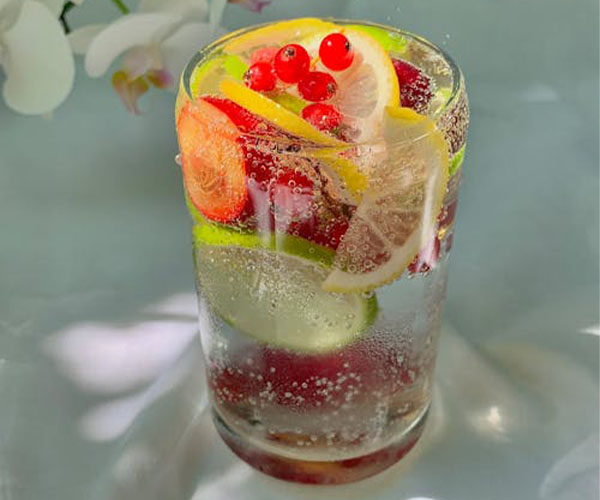
Cost Considerations
Initial Investment
The initial investment for a compact ice maker varies depending on the brand, model, and features. Prices can range from a few hundred dollars for basic models to over a thousand dollars for high-end machines with advanced features. When considering the initial cost, it’s important to factor in the specific needs of your bar, such as the volume of ice required, the type of ice preferred, and the available space. Investing in a high-quality machine that meets these needs can save money in the long run by reducing the need for frequent repairs or replacements.
Operating Costs
In addition to the initial investment, operating costs are a significant consideration for compact ice makers. These costs include electricity, water, and maintenance expenses. Energy-efficient models can help reduce electricity bills, while machines with water-saving features can lower water costs. Regular maintenance, such as cleaning and filter replacement, also incurs ongoing expenses. By choosing a machine with low operating costs and performing regular maintenance, bar owners can manage their budget more effectively.
Return on Investment
Calculating the return on investment (ROI) for a compact ice maker involves comparing the initial and operating costs to the benefits gained from the machine. Benefits include improved service speed, higher customer satisfaction, and increased revenue from serving more customers efficiently. A well-chosen ice maker can quickly pay for itself through these benefits, especially during peak seasons when demand for ice is high. Considering the long-term value and the impact on the bar’s operations helps in making a sound investment decision.
Common Issues and Troubleshooting
Frequent Problems
Even with regular maintenance, compact ice makers can encounter common issues such as:
- Ice Clumping: Ice cubes sticking together, often due to improper storage conditions or infrequent use.
- Slow Production: Reduced ice production speed, possibly caused by clogged filters, dirty components, or insufficient ventilation.
- Machine Noise: Unusual noises during operation, which could indicate mechanical issues or the need for maintenance.
Identifying these problems early and understanding their causes can help in resolving them quickly.
DIY Solutions
For minor issues, DIY solutions can be effective in restoring the machine’s performance. Some common fixes include:
- Cleaning the Machine: Regularly clean the ice maker to remove mineral buildup and impurities that can affect ice quality and production speed.
- Replacing Filters: Check and replace water filters as needed to ensure proper water flow and ice quality.
- Ensuring Proper Ventilation: Make sure the machine has adequate ventilation to prevent overheating and maintain efficient operation.
By following these simple steps, bar owners can address minor issues without needing professional help.
When to Call a Professional
Some issues may require professional attention, especially if they involve complex mechanical or electrical components. It’s important to recognize when to call a professional, such as:
- Persistent Problems: If the machine continues to have issues despite DIY troubleshooting.
- Electrical Issues: Problems with wiring or electrical components that require specialized knowledge.
- Major Repairs: Significant mechanical failures or damage that need expert repair.
Consulting a professional ensures that the ice maker is repaired correctly and safely, preventing further damage and ensuring reliable operation.
Frequently Asked Questions (FAQs)
General Queries
- How long does it take for a compact ice maker to produce ice?
- Most compact ice makers can produce the first batch of ice within 6-15 minutes, depending on the model and ambient temperature.
- What type of ice is best for cocktails?
- Cube ice is ideal for cocktails as it melts slowly and doesn’t dilute the drink quickly, preserving the flavors.
- Can I use tap water in my ice maker?
- Yes, but it’s recommended to use filtered water to prevent mineral buildup and ensure clear, high-quality ice.
Model-Specific Questions
- How do I clean my Scotsman ice maker?
- Refer to the user manual for detailed cleaning instructions. Typically, it involves running a cleaning cycle with a mixture of water and vinegar or a specialized cleaner.
- What is the warranty period for Hoshizaki ice makers?
- Hoshizaki ice makers usually come with a 2-3 year warranty on parts and labor, but it’s best to check the specific warranty details for your model.
- Can I leave my Manitowoc ice maker running overnight?
- Yes, Manitowoc ice makers are designed for continuous operation. However, ensure the ice bin is not full to prevent the machine from shutting off due to capacity limits.
Conclusion
Recap of Key Points
Compact ice makers offer numerous benefits for small bars, including space-saving design, efficient ice production, and cost-effectiveness. By understanding the different types of ice, key features, and important considerations, bar owners can make informed decisions when selecting the right ice maker for their needs.
Final Thoughts
Investing in a high-quality compact ice maker is a strategic decision that enhances the operational efficiency and customer satisfaction of a small bar. The right ice maker ensures a consistent supply of ice, allowing bartenders to serve drinks at their best quality and speed. By considering factors like capacity, production rate, energy consumption, and ease of maintenance, bar owners can choose a machine that meets their specific requirements and budget.
Call to Action
Explore the recommended models and consider the unique needs of your bar to find the perfect compact ice maker. Investing in a reliable ice maker not only improves service quality but also contributes to the overall success and reputation of your bar. For further assistance or inquiries, feel free to contact us or visit our website for more information.
Additional Resources
- Product Links: Visit our website to browse and purchase the recommended compact ice makers.
- Maintenance Guides: Access detailed maintenance and troubleshooting guides to keep your ice maker in top condition.
- Contact Information: Reach out to us for personalized advice and support in choosing the best ice maker for your small bar.

